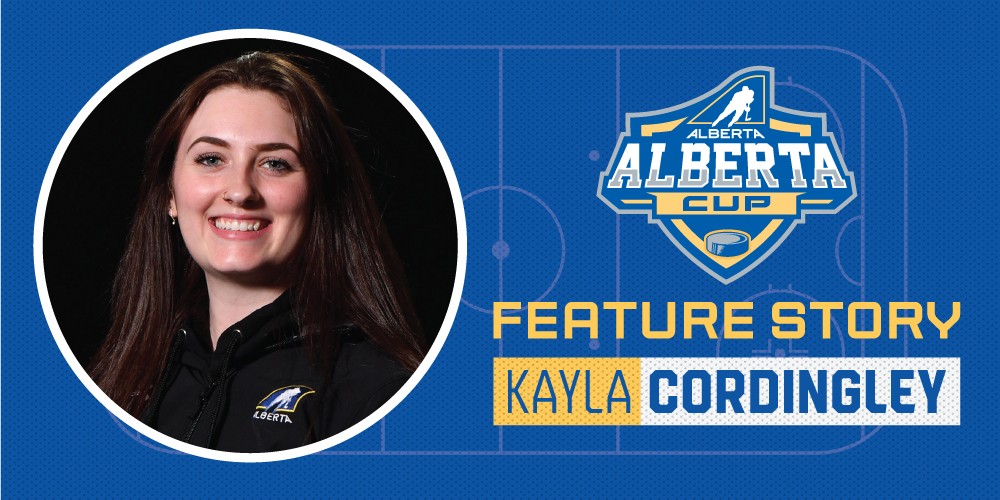RED DEER – Kayla Cordingley is looking to be a trailblazer and bring more diversity to professional sports.
Cordingley, who is spending this weekend with Alberta Green at the 2024 Alberta Cup and next weekend with South Black at the 2024 Alberta Challenge as the head trainer, wants to bring more female representation within the professional hockey, and sports in general.
In January 2022, Aisha Visram became the first, and so far only, female staffer to work on the bench of an NHL regular season game when she served as an athletic trainer for the Los Angeles Kings in a 6-2 win over the Pittsburgh Penguins. Along with that, a recent study by National Library of Medicine reveals that only 1.3 percent of head athletic trainers in the major sports leagues – the NBA, Major League Baseball, the NFL and NHL – are women.
“It’s been tough for females to gain that same recognition and representation as men, especially in hockey. It takes an effort and I know there are so many females in the profession now that are working towards the same goal as me. I’m just grateful that we support one another and that I’m part of that group,” said Cordingley.
Cordingley has become a familiar face at Hockey Alberta events over the past few years, getting her start from a recommendation from someone at the Circle K Classic in Calgary.
“He said I would be a good fit for Hockey Alberta and gave me Dave Campbell’s contact information. I bugged him a little bit, but it was during COVID so I couldn’t really get on. (Dave) probably had me bugging him for about two years … I finally got on and now I’m in my third year. I love it,” said Cordingley
So, what is it about Hockey Alberta and Spring Showcase that continues to bring her back?
“It’s the people. I love getting to meet new coaches, all the Directors (of Operations), and the athletes as well. Every year is so fun, and I gain so much out of it that it’s hard not to come back,” she said. “Just in terms of the networking, in terms of the experience, Hockey Alberta really builds you up.”
Cordingley has a major role in ensuring that the coaches and players can solely focus their attention and energy on the game. As the Trainer, she’s in charge of but not limited to; managing and preventing injuries, taping, manual soft tissue work, making sure the athletes are hydrated and prioritizing nutrition, setting up the dressing room, sharpening skates and fixing anything that happens in the middle of the game whether it be injury or equipment related.
“We’ve got to have that quick reaction to be able to manage anything that comes our way,” Cordingley said. “You have to be someone who thrives under pressure, and I’ve always been that person. I look forward to those moments because you do anything you can to get the players back in the game. Honestly it becomes a bit of a blur because you just lock in and do your job.”
Cordingley has gained a ton of experience since embarking on her journey towards working for a professional sports team. Some of the previous roles she’s held includes being the Trainer for the Calgary Royals program, Trainer for the Rocky Mountain Raiders U18 AAA team, Student Athletic Therapist at the University of Calgary working with the women’s basketball and football, as well as participating in several events with Hockey Alberta such as Spring Showcase, WHL Cup and National Aboriginal Hockey Championships.
Once she’s finished tending to the athletes these next two weekends, Cordingley is off to Saskatchewan as she earned an internship with the Canadian Football League’s Saskatchewan Roughriders.
“I wanted to go into medicine my whole life, that was something I always knew I wanted,” said Cordingley. “I applied for a medical company when I was younger, not expecting to do this, but my first shift was with a hockey team. From that day forward I wanted to stick to hockey and sports. I love the people, love the culture and it’s something that once you’re in it, you’ll never want to leave.”
Similar to athletes and coaches, there are some subtle changes that need to be made in order for Cordingley to transition from dealing with a team for an entire season versus short term competition that she’ll be seeing over the next two weekends.
“You have to emphasize a bit more on team building and building those relationships,” she said. “I find in hockey that a lot of these kids and coaches are used to the short-term competition. While there are some differences, I find that it’s easier to build those relationships quickly because you’re all working towards a common goal. It is sad though because it’s shorter. So, it’s always heartbreaking for me when it’s done because you only get a few months with them during the buildup and tournament itself.”

